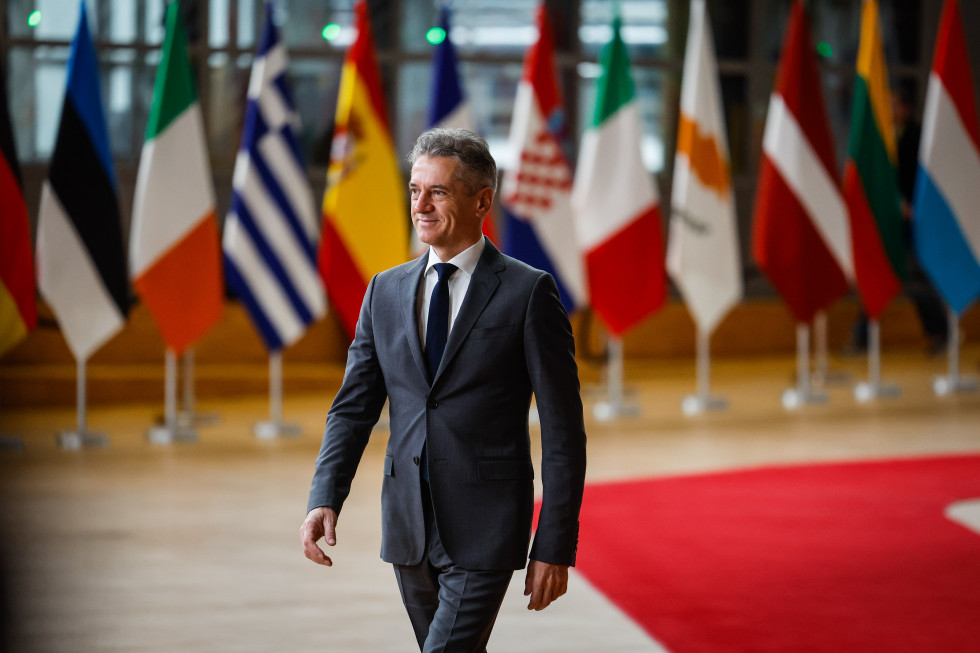Prime Minister following the European Council: Europe has kept its unity

Prime Minister Robert Golob upon arrival. | Author Anže Malovrh/Slovenska tiskovna agencija
The European Council unanimously and strongly condemned the terrorist attacks by Hamas in Israel, and called on Hamas to immediately release its hostages. It stressed Israel's right to self-defence, which must be in accordance with international law, in particular international humanitarian law. According to the latter, the protection of all civilians must be guaranteed at all times. The EU27 leaders expressed their deep concern at the deteriorating humanitarian situation in Gaza and unanimously called for rapid, safe and unrestricted humanitarian access to those most in need, including through the establishment of humanitarian corridors and humanitarian pauses. They stressed the importance of enhanced international cooperation to prevent the escalation of conflict in the wider region, and supported the initiative for an early international peace conference for the Middle East.
“An important leap has been made, which has been endorsed by all EU Member States, namely that, on the initiative of Spain, which Slovenia has gladly joined, we have introduced a call for a Middle East peace conference to be held as soon as possible. We have taken a step forward in the peace efforts and maintained unity,” said Prime Minister Golob on the margins of the Brussels meeting.
The Slovenian Prime Minister described the restriction of access to the basic necessities of life for civilians in Gaza, such as food, water, medical care and fuel for the smooth functioning of hospitals, as unacceptable and contrary to international humanitarian law. “What Slovenia stands for is that a peace formula for the Middle East be found as soon as possible,” he added.
In a debate in which the Ukrainian President Zelensky also participated by videoconference, the leaders reiterated their condemnation of Russia's aggression against Ukraine and expressed their unwavering support for Ukraine's sovereignty. The EU will continue to provide strong financial, economic, humanitarian, military and diplomatic support to Ukraine.
European Council members also discussed the revision of the Multiannual Financial Framework for the 2021–2027 period. They agreed that, in view of the growing challenges we are facing, an agreement must be reached by the end of this year. The question of which parts of the EU budget need additional funding and how to provide it remains open. “Slovenia supports a balanced package. Not only more money for Ukraine, but also for migration management, the EU Solidarity Fund and assistance to the Western Balkan countries on their way to the EU. Only such a package has, in our view, a chance of success,” the Prime Minister said.
In a discussion on other pressing issues, the leaders expressed their condolences and solidarity with the victims of the storms and other natural disasters that have struck countries in Europe and around the world in recent months. They stressed the urgency of climate change mitigation and adaptation and, above all, the need for a stronger global response and greater ambition ahead of the upcoming UN Climate Change Conference in Dubai (COP28).
On migration management, the European Council reiterated the importance of comprehensive cooperation with countries of origin and transit, of better control of the EU's external borders and return processes, and of strengthening legal channels into the Union.
A discussion followed on the situation in northern Kosovo. EU leaders condemned the attack on the Kosovo police in September this year, and called for the prosecution of those responsible. They called on the Serbian and Kosovo authorities to bring about a lasting peace. The European Council expressed regret that the parties were not fulfilling the commitments of the EU-sponsored dialogue, highlighting the establishment of a union of Serb municipalities. It also called for the early holding of elections in the north of Kosovo with the active participation of Kosovo Serbs.
In its final part, the European Council took stock of the state of the European economy and progress in boosting European competitiveness. It paid particular attention to deepening the single market, strengthening industrial policy and reducing strategic dependencies. It called for agreement on a reform of the EU's economic governance rules by the end of the year.
The meeting was followed by a summit of the eurozone countries, where leaders discussed inflation and other macroeconomic challenges in the eurozone with the President of the European Central Bank, Christine Lagarde. They took note of progress on the capital markets union and the banking union.
